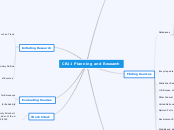CR11 Planning and Research
Work Cited:
Rottenberg, Annette T. and Donna Haisty Winchell. Elements of Argument: A Text and Reader. 11th ed. Boston, MA: Bedford/St. Martins, 2003/2015
Evaluating Sources
Evaluating Sources for Reliability
Make a more in-depth evaluation once you selected some useful sources to support your claims
Evaluating Sources for Relevance
The sources you find provide useful information that you nees for your paper and help you support the claims
Initiating Research
Types of Sources
Secondary Research
Secondary sources provide commentary on and analysis of a topic
Primary Research
Primary sources are firsthand information
Sketching a Preliminary Outline
An outline is usually not written in complete sentences
Keeping Research on Track
Be sure to use the right number of sources
Do not ignore information that opposes the position you plan to support
Do not let your sources' opinion outweigh you own
Be sure your sources are authoritative
Use a variety of sources
Look for at least 2 pieces of evidence to support each point you want to make
Focus your investigation on building your argument
Taking Notes
Managing and Documenting Sources
Taking notes using a computer gives you more flexibility than using pen and paper alone
Working with Your Outline
As you take notes, also remember to refer to your outline to ensure that you are acquiring sufficient data to support all the points you intend to raise
Note Taking and Prewriting
Prewriting helps you analyze the ideas you record from outside sources
Finding Sources
Multimodal Sources
The Internet may give you ideas for livening up your own work with all sorts of visuals
Web-Based Sources
Helpful if you are looking for information about organizations, current events, political debates, popular culture, or government-sponsored research and activities
Government Resources
Beyond statistics, government agencies compile and publish a wealth of information
Opinion Polls
Some of these are available in libraries
United Nations
Other Federal Agencies
Gather statistical data
U.S. Bureau of the Census
Produces a wealth of statistical data
Statistical Resources
Used as evidence in an argument
Encyclopedias
Have excellent selective bibliographies
Offer quick reviews of topics and easy access to factual information
Databases
Features that appear in many databases:
Options for Saving Records
Truncating Search Terms with Wild Cards
Limiting a Search
Searching for More Than One Concept
Keyword or Subject Searching
To search for books, videos, or periodical publications, use the library catalog
Some databases may be available only in the library; others may be accessible all over campus
Finding an Appropriate Topic
Evaluating Possible Topics
Not Too Unconventional
Look first for a cause that is not too hard to accept when offering an explanation
Not Too Narrow
The subject will be too narrow if a writer can cover the subject in a paragraph or even in a single page
Not Too Bored
The more specific your topic, the better the resulting essay
Debatable
Choose a topic that can be seen from more than one perspective
Interesting
The topic must interest the audience
Invention Strategies
Write down all the possible topics when considering

